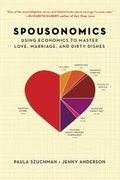Using economics to make your relationship more successful
In Spousonomics: Using Economics to Master Love, Marriage, and Dirty Dishes, reporters Paula Szuchman and Jenny Anderson attempt to solve some of marriage's stickiest issues by applying the precision of the dismal science to the messiness of relationships.
 Good luck with that, I thought.
Good luck with that, I thought.
However, while sometimes a bit of a stretch, it is a fun read, assuming you see every relationship having its own little economy, a business of two, if you will, with a finite number of scarce resources that need to be allocated efficiently.
In a chapter comparing economic bubbles to the giddiness of young love, for instance, the authors point out that things change dramatically when the price of something rises far above its actual worth.
This is exactly what happens to couples early in their relationship, they argue: Early on, we tend overvalue each other and become blind to each other's faults. As a result, we don't heed clear warning signs that, in hindsight, would have highlighted issues that should have been dealt with earlier.
It's all about tradeoffs. Spouse clamoring for more family time together? What if you came home 15 minutes earlier from work every day? Over a week, that's extra time with the family and, really, barely anything from your workday.
The chapter on the division of labour, for example, points out that couples who divide household chores using the theory of comparative advantage -- do what you do best and trade for the rest -- might work better than splitting duties right down the middle.
In marriage, "you're not only business partners in the sense that you work together for the good of your company, you're also trading partners who exchange services, often in the form of household chores."
Life needn't a 50/50 split for each person to be happy. It could be 60/40 or more depending on whether you can put away the calculator and decide what really works best rather than what you think should work best, the authors maintain.
“A good marriage is where both people feel like they're getting the better end of the deal,” says writer Anne Lamott. Sound like anybody you know?
By Gordon Powers, MSN Money




Posted by: Colour of money | Nov 29, 2021 4:12:07 PM
That's my Christmas gift to my wife.